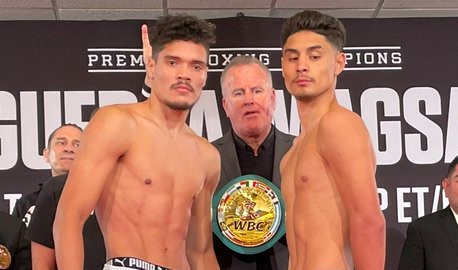By: Jesse Donathan
Did Brock Lesnar retire from mixed martial arts because he failed another USADA prohibited drug test? “If you were a level of conspiracy theorist, or as we do over here, we just simply speculate, and visit, and talk, there is some clues to point to that is a possibility, said Bad Guy Inc. CEO Chael Sonnen in his May 9, 2019 YouTube video titled, “Did Brock Lesnar fail a USADA drug test and retire?” An ESPN analyst and current Bellator fighter, Sonnen is a former UFC middleweight challenger who counts UFC President Dana White among his friends. In other words, Sonnen is an industry insider and someone you should listen to when he has something to say.
Sonnen, who once famously thrashed Anderson Silva in the Brazilians’ prime before succumbing to a come from behind triangle armbar submission in the fifth and final round went on to list a litany of reasons of why its possible that rumors of a Lesnar failed USADA drug test could possibly be true:
“The first of which is Brock Lesnar retired out of nowhere, he retired out of nowhere after taking a lesser WWE schedule, he retired out of nowhere after going into training for 12 full months. He retired out of nowhere after entering and clearing the USADA protocol of things that he had to pay for from his last outing at UFC 200 against Mark Hunt.”

As Sonnen correctly surmises, Lesnar’s abrupt retirement from MMA came out of left field. Everything was pointing to a Lesnar return to the cage; he had been training with Gable Stevenson, one of the top collegiate wrestlers in the country at the University of Minnesota and had shoved the UFC heavyweight champion Daniel Cormier across the octagon at UFC 226 in a picture-perfect promo in the lead up to the fight. “It looked like all; everything was a go. He had a world title fight, he had a main event, he had a huge pay day, he had Daniel Cormier standing in front of him,” Sonnen exclaimed, and out of nowhere, Lesnar retires.
“Guys, I don’t want to add to something right now, I want to come to you candidly and tell you that I do not have information but I am starting to hear things from people who generally do have the correct information that perhaps that wasn’t totally wrong,” Sonnen said on the rumors of a Lesnar issue with USADA that went ignored by the MMA media when the information first started trickling out.
“The new way that USADA is operating, okay, I’ll remind you of the old way first. Which was a guy flags, boom! They put out a boilerplate statement, the only thing they change between athletes is simply the name. John Doe right, fill in the blank, and the whole rest of the uniform statement. We get it. But when USADA got confronted with five people who were later cleared and the USADA was able to look at it and go you know what, we didn’t total clear out, we cleared them, but in the world of PR and the mess they went through, in the minds eye, the day of the internet, the sponsors that were already lost, its just very hard to unfry that egg.”
The Bellator light heavyweight contender who lost to “The Last Emperor” Fedor Emelianenko in a valiant effort during the Bellator Heavyweight World Grand Prix Tournament last year at Bellator 208 went on to say of USADA’s new approach to handling athletes who may have flagged a prohibited substances test:
So, what we’re gonna do now is if we flag somebody, we are not going to say a word. They will very quietly not be booked for a contest but we will also very privately see the process through to the very end. And when we make our release, we will not only tell you who, what and when but we will also tell you what the remedy was. Whether it’s a disciplinary action or a clearing of the athlete. But we will present one statement to you in its entirety. Okay great, really good way to do things. There is now some people that are saying that they have dug into this and it’s the very spot Brock Lesnar is in.”
Prior to Sonnen’s fire side chat, Dave Metzler on Wrestling Observer Radio had suggested that the new UFC deal with ESPN had been a factor in Lesnar’s retirement, according to Sonnen that just isn’t the case.
“It is a very strange circumstance, and it seems that there was then a later dialogue that came in and said no, the reason Brock walked away is because the pay-per-view model has changed, and therefor he can’t collect his pay-per-view points and therefor he lost his enticement to do this. Now, that is, I can tell you now that is not what happened. I don’t know what happened, but I think it’s probably a pretty straight forward. One, either, we’re going to find something out in the next 45 days or two, and far more likely if I am being fair, far more likely, he started training and his body was just sore and tired and he wasn’t getting the same reaction as fast as he had in the past and he said I’m done.”
As reported by Foxsports.com in their January 4, 2017 article titled, “Brock Lesnar suspended one year by USADA after failing two drug tests,” the WWE superstar infamously, “tested positive for clomiphene and its metabolite, 4-hydroxyclomiphene, following an out-of-competition urine test conducted on June 28, 2016, and an in-competition urine test conducted on July 9, 2016, at UFC 200 in Las Vegas, Nev. Clomiphene is a prohibited substance in the category of Hormone and Metabolic Modulators and is prohibited at all times under the UFC Anti-Doping Policy.”
According to USADA.org, “In men, clomiphene can alter testosterone levels by interfering with the negative feedback loop of the hypothalamic–pituitary–gonadal axis.” Interestingly, the USADA description of clomiphene goes on to state that, “clomiphene is not FDA-approved for use by men for any condition,” but there are some exceptions to that claim as USADA goes on to state.
“However, it may be prescribed off-label, meaning that a doctor may prescribe a medication for a use that is not indicated on the FDA’s approved packaging insert or label. Once the FDA approves a drug, healthcare providers can typically prescribe the drug for an unapproved use when they judge that it is medically appropriate for their patient.”
The USADA clomiphene description goes on to state that, “In males, similar to other substances with anabolic properties that lead to increased muscle mass, clomiphene is associated with a number of potential and serious side effects, including: increased risk of negative cardiovascular events, liver damage, and gastrointestinal discomfort.”
In an April 24, 2012 bleacherreport.com article titled, “Brock Lesnar: Understanding Diverticulitis, the Illness That Changed His Life,” author Louie Babcock wrote that, “In November of 2009, Brock was diagnosed with mononucleosis, and later in the month it was discovered he had a serious case of diverticulitis.” According to Babcock, “Diverticulitis is a disease of the digestive tract, normally in the large intestine. On the colon of the patient, tiny pouches form. These pouches are called diverticula. When these pouches become inflamed, diverticulitis is diagnosed.” The bleacherreport.com article would go on to note that Lesnar suffered another bout of diverticulitis in May of 2011, retiring after his last match in December of 2011 against Alistair Overeem before coming out of retirement to face Mark Hunt at UFC 200 in 2016.
According to dopinglinkki.fi, “Clomiphene is a doping substance according to the Penal Code. Particularly men, who use anabolic steroids, commonly use clomiphene or other anti-estrogens (for example, tamoxifen) as an accompanying drug.”
Dopinglinkki.fi would go on to state that, “The purpose of clomiphene, in this case, is to inhibit the estrogen problems caused by the overdosed anabolic steroids, that appear when anabolic steroids convert in the body to estrogens or other metabolic products that have estrogenic effects.”
With Lesnar’s history of at least two bouts of diverticulitis in 2009 and 2011, one would think that Lesnar would have been weary of using Clomiphene, a drug described as causing “gastrointestinal discomfort” as one of its potential side effects. Which immediately brings me to one of the oldest questions plaguing mankind. Which came first? The chicken or the egg? The answer to that question could very well let many cats out of the bag.
According to thesmokinggun.com, “Brock Lesnar, the World Wrestling Entertainment champion, was once arrested for illegally possessing steroids, though the felony charge against the 26-year-old athlete was dismissed four months after his January 2001 arrest.” The report would go on to state:
“Lesnar was exonerated when tests showed that the seized pills were not, in fact, steroids. While a Louisville detective told TSG that the material was some kind of growth hormone, Lesnar’s defense attorney, Scott Cox, characterized the confiscated pills as a ‘vitamin type of thing.’”
Regardless of the true circumstances of Lesnar’s retirement(s), health problems and reported prohibited drug use, there is no question that Brock Lesnar is a huge draw for both the WWE and UFC. Former K-1 kickboxing champion Mark Hunt once famously sued UFC President Dana White, Lesnar and the UFC, accusing them of collusion, “in an effort to allow Lesnar to use performance enhancing drugs,” according to a February 15, 2019 ESPN.com article titled, “Judge dismisses most of Mark Hunts case Against UFC, Brock Lesnar,” by Brett Okamoto.
According to ESPN, “U.S. District Judge Jennifer A. Dorsey threw out all but one of the claims Hunt made against the UFC,” with the Judge ordering, “Hunt and the UFC to enter a mandatory settlement conference on the final outstanding claim — breach of the implied covenant of good faith and fair dealing. That claim is against the UFC only. All of Hunt’s claims against White and Lesnar were dismissed.” Putting the pieces together, the extent of the breach of the implied covenant of good faith and fair dealing could potentially stretch back some time in this case with the reader being left to make up their own minds as to what the actual truth may be.


















